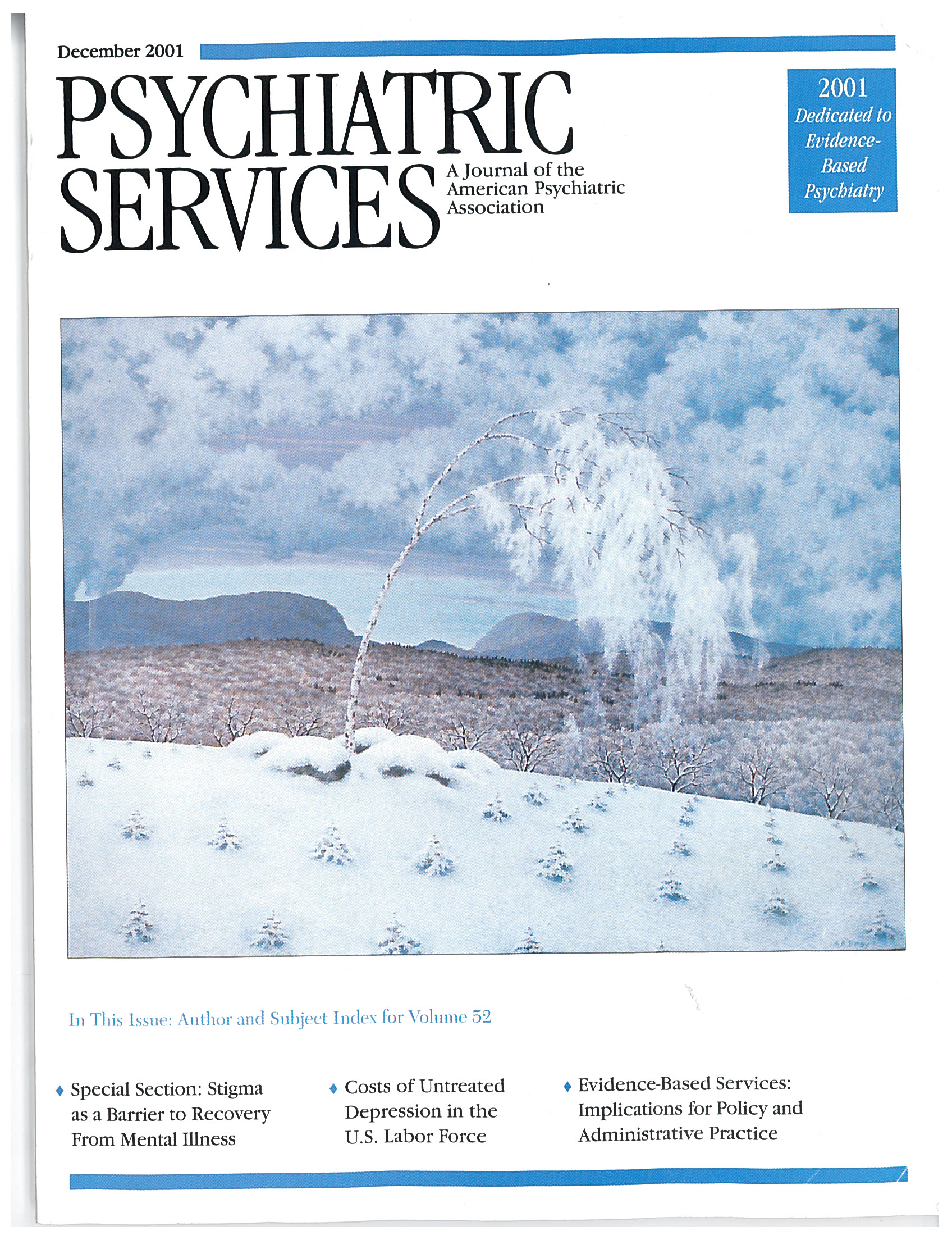This Month's Highlights
Focus on Evidence-Based Practices
In 2001 Psychiatric Services has featured a series of articles on implementing evidence-based practices for people with severe mental illness. In this issue, we wrap up the year with three important articles in the series. In the first, Howard H. Goldman, M.D., Ph.D., and his colleagues describe the policy and administrative-practice implications of implementing evidence-based services, particularly in the public sector. Using the framework of the U.S. Surgeon General's 1999 report on mental health, the authors outline eight courses of action for addressing the gap between science and practice. They also describe an infrastructure that has been created in several states to support systemic change (see page 1591). In the second article, Patrick W. Corrigan, Psy.D., and his coauthors examine strategies to encourage frontline staff to incorporate evidence-based practices into their team treatment approach and their day-to-day work with clients (see page 1598). In the third article, Robert A. Rosenheck, M.D., shows how the realities of large, complex organizations often create barriers to the implementation of innovative programs and describes ways to engage the energy of organizational processes to facilitate change (see page 1607).
Stigma as a Barrier to Recovery
The Surgeon General's 1999 report on mental health cited stigma as "the most formidable obstacle to future progress in the arena of mental illness and health." In this month's issue a special section of four articles highlights current research that shows the pervasive and corrosive effects of stigma on adherence to medication regimens, self-esteem, and social adaptation of people with mental illness, regardless of their diagnosis, and on the well-being of their family members. In an overview of the four articles, Deborah A. Perlick, Ph.D., guest editor of the special section, focuses attention on the ways that stigma creates barriers to recovery, both in reducing the effectiveness of psychosocial rehabilitation and in impeding the restoration of self-esteem, a sense of purpose, and a better quality of life. (The special section begins on page 1613.) In Taking Issue, Jeffrey L. Geller, M.D., M.P.H., discusses how programs with the best of intentions may result in stigmatization of people with mental illness (see page 1559).
The High Costs of Depression in the Workplace
The World Health Organization has predicted that by 2020 depression will be the second most common disease and will account for 15 percent of the world's disease burden. In this issue, Richard J. Goldberg, M.D., and Steven Steury, M.D., review the prevalence of depression in the workplace and its associated disability and cite cost figures from current research. They point out that workers' compensation boards have been slow to recognize depression as a work-related disability and that employers remain unaware of the favorable cost offsets associated with treating workplace depression. They also address the controversial issue of the ways in which workplace conditions contribute to depression among workers (see page 1639).
Treating Insomnia in Late Life
After the September 11 terrorist attacks, Marion Z. Goldstein, M.D., editor of the Practical Geriatrics column, telephoned the journal's office to discuss the December column. In her New York practice, she had seen a sudden increase in complaints of insomnia among elderly patients, and she felt that it was important that her next column address the diagnosis and treatment of insomnia in late life. Papers on other topics were put on hold while Dr. Goldstein wrote her column this month describing sleep disorders and conditions and situations that contribute to them. Dr. Goldstein reviews interventions for insomnia and ways to adapt them for elderly patients (see page 1573).
Residents' Series
The first article in a new and ongoing series by, about, and for psychiatric residents and those who train them describes a program at the Portland, Oregon, VA Medical Center that trains residents to provide integrated psychiatric and medical care in a primary care setting. Steven K. Dobscha, M.D., and Linda Ganzini, M.D., describe how the program has overcome traditional barriers, and they report results from the program's first year (see page 1651). Avram H. Mack, M.D., is editor of the residents' series.
Briefly Noted…
• The Economic Grand Rounds column examines how managed care has affected the supply of and demand for psychiatrists and asks whether, in response to conditions imposed by managed care, psychiatrists have made themselves less available (see page 1587).
• In the Emergency Psychiatry column, Michael W. Kahn, M.D., describes four strategies to help clinicians overcome common pitfalls in dealing with patients in the emergency department who have little or no interest in receiving treatment (see page 1571).



